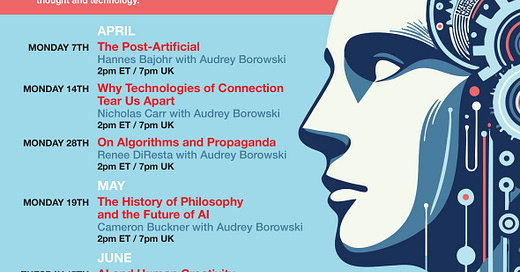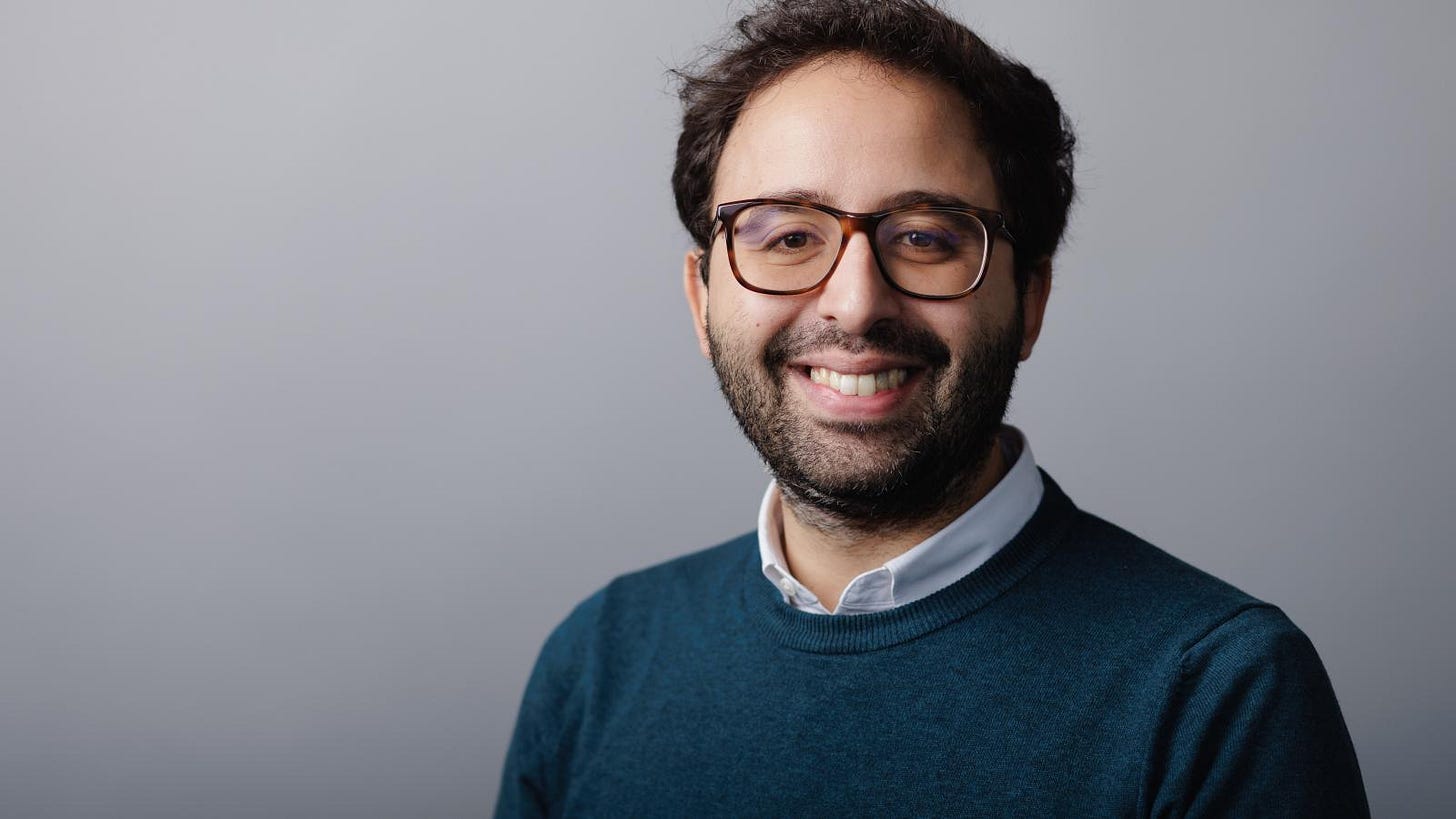Trans-Inclusive Philosophies; The Post-Artificial; Meet the Editors
An essay by Sophie Grace Chappell; an event with Hannes Bajohr; a Q&A with Paul Giladi
Dear all,
I am excited that Audrey Borowski’s “AI and the Digital” series is starting again tomorrow, with another incredibly strong line-up (more on this below). It is always such a pleasure to work with Audrey, and we are so grateful for all the hard work she puts into these series of talks.
At the end of this newsletter, we are introducing a series of Q&As with our new managing editors. Big thanks to Paul Giladi for agreeing to be the first participant!
Your Sunday Read
“Trans-Inclusive Philosophies”
An essay by Sophie Grace Chappell
This edited transcript of a recent talk given by Sophie Grace Chappell looks at the role of theory and system building, both in philosophy more generally and trans philosophy more specifically. Chappell notes that we do not have a simple theory of being trans, and that we do not in fact we need one. What should count is not theory, but lived experience. She concludes that if theories were allowed to coexist, this would be better than if any of them is supposed to be the truth about all trans people. You can read her essay here.
Monday Event: 11am PT/2pm ET/7pm GMT/8pm CET
“The Post-Artificial”
Hannes Bajohr in conversation with Audrey Borowski
This week we welcome back Audrey Borowski for the second series of her wonderful “AI and the Digital”!
Humans and their tools have always been entangled to such a degree that it is difficult to say where one ends and the other begins. This has also been the case for the involvement of writing tools, as media studies has pointed out repeatedly. But with the introduction of generative AI, a qualitative rather than just quantitative difference might have occurred. For only now, and in retrospect, does it become apparent that the origin of a piece of writing has been assumed to be human – an assumption that has now come under attack and, as Hannes Bajohr will argue in this event, will dissipate in the “post-artificial,” a state in which the difference between “natural” and artificial writing has come undone. You can find out more and register here.
Recording of Monday’s event
Those of you who missed Paul Kelly discussing “Is Post-Liberalism the Future?” with Alexis Papazoglou can watch the recording here:
Meet the Editors
As you may know, The Philosopher now has a new editorial team in place. In the months ahead, you can get to know a bit about them as they answer some questions. This week, it is Paul Giladi, head of our groups/classes team, and organiser of the recent “Inclusive Philosophies” series.
(Big thanks to Rémy-Paulin Twahirwa for coming up with this idea, and for the questions.)
Name: Paul Giladi
Current Occupation/Affiliation: Senior Lecturer (Associate Professor) of Philosophy, SOAS University of London
What drew you to philosophy? What’s the relevance of (public) philosophy today?
For me, philosophy’s draw lies in being a subject that is focused on creating and widening conversations about what really matters. The relevance of public philosophy today – more so than academic philosophy – cannot be downplayed: locating and celebrating the wealth of philosophical knowledge beyond the ‘ivory tower’ means that the public can more confidently articulate a critical disposition towards a range of status quo arrangements, such that the ‘love of wisdom’ and the ‘love of justice’ ultimately become one and the same project.Is there a particular philosophical tradition, thinker, or concept that has deeply influenced your work?
Oh gosh – where to begin! For me, I would say it’s Hegel, as what is central to my work is finding ways of complexifying basic categories (such as the relationship between the categories of nature and normativity), making sense of a plurality of social and political crises as substantive failures of recognition, and thinking how the concrete subject of experience reveals multiple layers of gendering, racializing, and sexualising processes – many of which are wrapped up in legacies of coloniality.
What role do you think philosophy plays in today’s world, and how can it contribute to social change?
I think philosophy’s role is to foster the development of critical capacities, not just for the purpose of keeping the conversation about matters going, but mainly to enable the reproduction of a democratic lifeworld and a caring, compassionate citizenry.
What’s a philosophical question or debate that keeps you up at night?
The Problem of Cruelty. Part of the reason for this is because of a strange reluctance in many circles to define a range of social and political problems as rooted in structures of cruelty.
What are the biggest challenges in making philosophy accessible and engaging to a broader audience?
Academic jargon and a view of public philosophy as a platform for academics to generate impact. These two totems of bad practice render silent the philosophical knowledge of people outside academia, to the point that philosophy – when institutionalised – loses its ability to nurture citizenry and encourage democratic ways of living.
Can you share a book, essay, or article that profoundly shaped your thinking?
Cora Diamond’s 1988 essay ‘Losing Your Concepts’. A really beautiful, enriching piece of work.
How do you approach the editorial process—what do you look for in a strong philosophical piece?
A strong philosophical piece is one which makes it super-clear what the author thinks, serves to make a robust contribution to knowledge production by challenging existing consensus about the subject, ideally engages in cross-cultural thinking, and can enable a wide range of audiences to experientially relate to the content – through accessible everyday examples and/or a range of lived experiences.
What’s an underrated or overlooked idea in philosophy that deserves more attention?
‘Ubuntu’ – a key concept in sub-Saharan African moral theory, loosely translated as ‘humanity’ – doesn’t yet have the attention it deserves in academic philosophy.
If you could have a conversation with any philosopher, living or dead, who would it be and why?
I would love to have a conversation with Frantz Fanon. This is because the Conclusion to his The Wretched of the Earth is so thought-provoking in its prophetic articulation of a ‘critical humanism’ – a notion of humanity that would move beyond Western Europe, and be forged by the ‘Global South’.
What’s one misconception people have about philosophy or philosophers?
That philosophers tend to be super-serious folk who have no real-world skills.
Can philosophy change the world? If so, how?
I think it can – by providing people with the conceptual tools and vocabularies to make sense of injustice and to articulate narratives of justice.If philosophy had a soundtrack, what music would be on it?
Rage Against the Machine’s ‘Wake Up’, Don McLean’s ‘Vincent’, Aretha Franklin’s ‘Respect’, Nina Simone’s ‘Don’t Let Me Be Misunderstood’
What’s a philosophical joke, anecdote, paradox, or puzzle that you love?
This video is a genius parody, which softly sends up many male undergraduate Anglo-American analytic philosophy students:
How do you see The Philosopher evolving in the future? What kind of contribution do you want to make it as an editor?
I see The Philosopher evolving by principally expanding its groups/classes provision. The kind of contribution I want to make as part of the Editorial Collective is for the organisation to be a melting pot of creative, irreverent, and life-affirming work, devoid of any barriers to entry and participation, and which overcomes the divide between academic and non-academic.
Ending
The Philosopher is unfunded and relies on your support to keep doing the work we do. Through becoming a supporter via Patreon, you can get all our print/digital issues sent to you, enjoy priority access and discounted rates for our groups/classes, join philosophical discussions with our editorial team, and more. The income we generate via Patreon helps us to keep our events series free and to pay our contributors. You can find out more and become a member here.
Wishing you all a lovely Sunday, wherever you are.
Anthony Morgan
Managing Editor






A thought-provoking, informative and inspiring essay by Sophie Grace Chappell. And timely - given the UK supreme court's ruling about the legal definition of "woman" yesterday. I wish I could make everyone read this!
Theories are built to fit humans - humans aren't built to fit theories... Indeed!
Thank you.